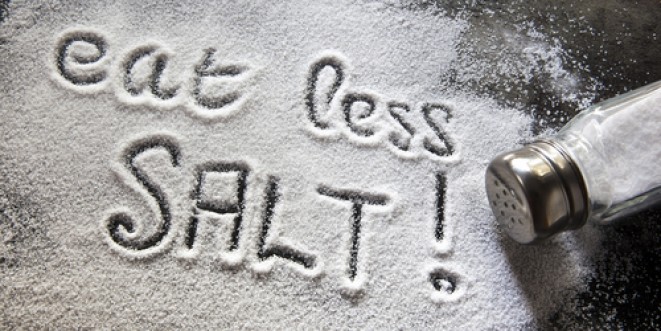“Less Salt, Please!” Rethink the Cube
By Cordialis Msora-KasagoPublished: April 14, 2014

Healthy Eating
The “cube” is a staple in almost every Nigerian kitchen. We use it in our soups, stews, vegetables and sometimes rice dishes. It is such a popular ingredient that over 1 million cubes and tablets are sold throughout West and Central Africa, every single day. However, did you know that each cube can contain as much as 2000 mg of sodium? That is the equivalent of 1 teaspoon of salt. What more, Nigerians use at least 2 cubes per meal and often add more salt while cooking or eating. Given the high amount of salt in cubes, it is time to rethink our seasonings.
Each cube can contain as much as 2000 mg of sodium
Why care?
Nigerians are genetically predisposed to high blood pressure. In many people, diets high in excess sodium have been demonstrated to increase blood pressure. Salt is the body’s main source of sodium- a nutrient that helps in the transmission of nerve impulses, muscle contraction and relaxation as well as in the regulation of body fluids.
Too much sodium in the blood stream results in the body holding onto extra fluids, making the heart work harder. As the fluid accumulates, blood pressure increases. If not taken care of, high blood pressure weakens the heart muscles and increases risk for a heart attack, stroke and kidney failure.
A reduction in the amount of salt in the diet has been shown to positively impact blood pressure. Since the cube is so high in sodium and yet in almost all Nigerian dishes, reducing its intake, or eliminating it from the diet, may help improve your health.
If no cube, then what?
Despite popular belief, the cube is not a traditional Nigerian ingredient. It was invented in Switzerland and brought to Nigeria by traders and settlers. Over the decades, it has become a staple and it is hard for many to cook without it.
Fortunately, there is taste without the cube. Food cooked without it does not have to be boring and tasteless. There are many herbs and seasonings that kick the flavour up and keep your family coming for more without the added salt. Here are a few suggestions.
- Taste the true flavours of food. Once you begin to reduce the amount of salt you eat, you allow the natural flavour of food to come through. Try it! Your taste buds will thank you.
- The cube is a concentrated stock in solid form, so why not make your own stock. Begin by gathering a few bones and vegetables, add some water, celery, parsley, garlic, pepper and other herbs. Bring to the boil and simmer for a few hours. Allow to cool before straining the liquid. Voila! You have just made your own seasoning stock. You can even add some salt to it. Just be mindful of how much. ¼ teaspoon or less is ideal.
- There is a wide variety of herbs and spices that add much flavour and color to food. Use the table below as a guide to seasoning dishes without adding salt.
|
When Cooking |
Try using these seasonings |
|
Chicken |
Basil, garlic, cloves, hot peppers, ginger, oregano, paprika, parsley, curry, thyme, turmeric, onion, rosemary, sage, red bell pepper. Citrus juices, chives, white wine |
|
Beef |
Basil, bay leaf, curry, garlic, marjoram, onion, parsley, hot peppers, thyme, green bell pepper, ginger , red wine |
|
Fish |
Basil, bay leaf, garlic, curry, dill, green bell pepper, onion, parsley, turmeric, lemon juice, lime juice, |
|
Pork |
Applesauce, basil, cloves, chives, garlic, onion, rosemary, sage, thyme |
|
Lamb |
Cloves, curry, garlic, mint, onion, oregano, parsley, pineapple, rosemary, thyme |
|
Eggs |
Curry, garlic, green bell peppers, hot pepper, mushrooms, onions, chives, paprika, pepper, tomatoes |
|
Vegetables |
Garlic, basil, ginger, lemon juice, marjoram, onion, chives, tomato |
The taste of salt, and the cube are acquired. No one is born with an innate desire for salty foods. Just like you learned to enjoy eating food with added salt, you can learn to enjoy the natural taste of food. With the rising rates of blood pressure, rethink your cube and use less salt please.
Here’s to your health!

- 5 Foods That Reduce Your Risk For Cancer - April 28, 2015
- 5 Diet Blunders That Are Increasing Your Risk For Cancer - April 28, 2015
- Defeating Diabetes: The Best Way to Beat It Is to Never Develop It - November 4, 2014
- Planning Vegetarian Meals That Meet Your Nutritional Needs - June 17, 2014
- Clean Eating: What You Need To Know - September 16, 2015
- Want To Make Better Food Choices? Read The Nutrition Label! - August 20, 2014
- Breastfeeding: The Winning Goal For Life - August 1, 2014
- Juices Or Smoothies: What’s Best for Health? - October 14, 2014
- 11 Delicious Ways to Eat More Beans, Peas and Lentils - January 19, 2016
- Moin-Moin: To Peel Or Not To Peel The Beans - July 16, 2014











